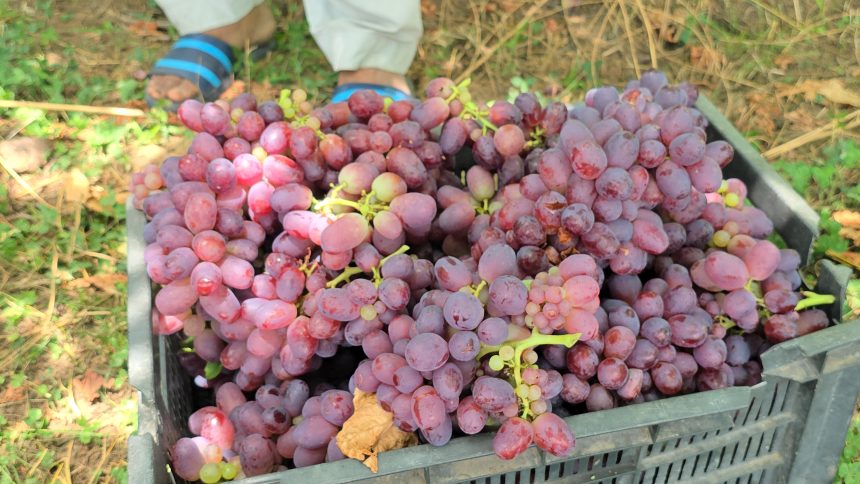The village of Repora in Central Kashmir’s Ganderbal district is one of the major agricultural heritages in Kashmir Valley. While Kashmir is renowned for its picturesque landscapes and exquisite saffron, Repora has carved out its niche on the global stage through its exceptional grape cultivation. The village’s vineyards, renowned for their unique produce, are a vital part of Kashmir’s agricultural output, contributing significantly to the region’s economy and the livelihoods of its residents.
Repora’s distinction in grape farming is not merely a result of favorable geographic conditions but also due to the unique timing of its grape harvest. The grapes of Repora Ganderbal are ready when fresh grapes are scarcely available in the rest of the world. This advantage has positioned Repora as a key player in the global grape market, with its produce being highly sought after during this window.
However, the 2023 grape harvest in Repora faced a significant challenge due to unexpected rainfall. This unseasonal weather delayed the harvest, which could have been a severe setback for the village where nearly 90 percent of the population depends on grape farming. Yet, despite this challenge, the village witnessed a substantial increase in grape production. This resilience and the resulting bumper crop highlight the adaptability of Repora’s farmers and the potential for a fruitful season despite adverse conditions.
Kashmir’s grape production, which ranges from 1100 to 1500 metric tons annually, relies heavily on Repora’s contribution of 700 to 900 metric tons. This immense output is supported by approximately 60 hectares of land dedicated to grape cultivation in the village, making grape farming the backbone of Repora’s economy. The success of grape farming here not only sustains hundreds of families but also solidifies the village’s reputation as a grape-growing powerhouse.
The roots of grape cultivation in Repora trace back to the era of Maharaja Hari Singh, the last ruling Maharaja of the princely state of Jammu and Kashmir. Maharaja Singh initiated grape farming on his land, which is now under the management of the Department of Horticulture. Over the decades, Repora has expanded its repertoire of grape varieties, including Sahibi, Hussaini, and Thomson. Each variety has its distinct characteristics, contributing to the village’s diverse and rich grape production.
What truly sets Repora’s grapes apart on the global stage is their extraordinary size. The international standard for high-quality grapes is a berry weighing 4 to 5 grams. In contrast, Repora’s grapes far exceed this standard, with some berries reaching an impressive weight of 14 to 15 grams. This remarkable achievement has not gone unnoticed. Abdul Rashid, a local farmer, recounted the awe of a team of experts who visited the village and were astonished to find grapes weighing 15 grams—a feat unmatched anywhere in the world.
The villagers of Repora believe that their prosperity in grape cultivation is due to the blessings of a revered saint, Mir Syed Shah Sadiq Qalandar (RA), who is said to have lived in the area. The locals attribute their success to divine favor, often stating, “It is the blessing of Shah Sahib (RA),” reflecting their deep spiritual connection to the land and its produce.
Farmers from the Repora are calling on the government, particularly the horticulture and agriculture departments, to support them in adopting modern techniques and gaining access to new knowledge and awareness. The villagers emphasize the need for better facilities, such as refrigeration, which would enable them to store their produce longer, increase their yield, and improve their economic conditions.
Repora is not just a village; it is a symbol of agricultural excellence in Kashmir. Its grapes, renowned for their size and unique timing, have earned it recognition on the global stage.








